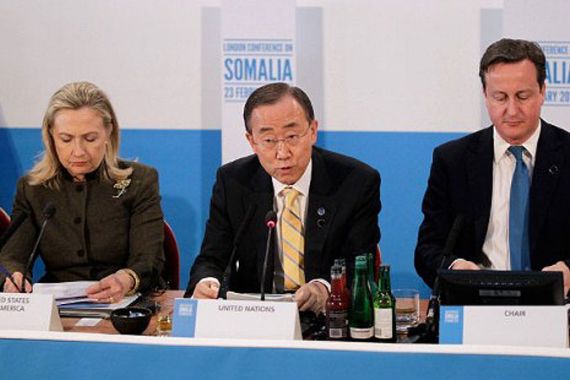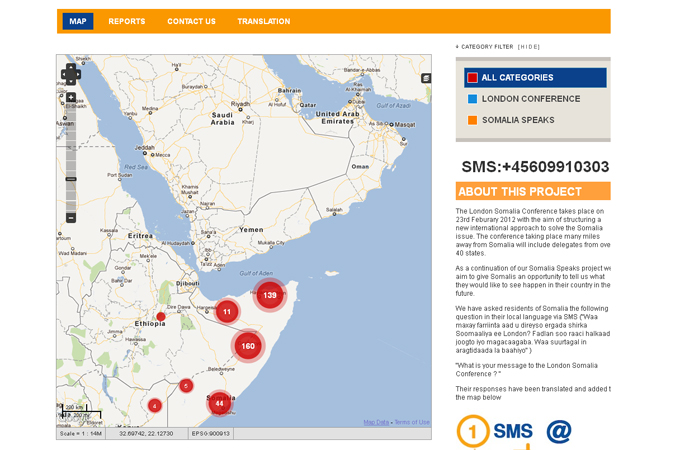Conference calls for action in Somalia
Leaders in London warn world will “pay the price” for failing to help the country tackle instability, war and piracy.

Global leaders have called for urgent action on Somalia, warning that the world will “pay the price” for failing to help the country tackle its problems of political instability, civil war and piracy.
Speaking at a conference in London along with dozens of other leaders on Thursday, David Cameron, the British prime minister, said Somalia’s issues were “a complex jigsaw puzzle where every piece has to be put into place. It is all about the patient work of helping the Somali people to re-build their country from bottom-up”.
Cameron concluded: “So, today, we have reached agreements on seven key areas: security, piracy, terrorism, humanitarian assistance, local stability, reinvigorating political process and international co-ordination.
“If the rest of us just sit back and look on, we will pay a price for doing so.”
The participants at the meeting agreed a representative Somali government should replace the current Transitional Federal Government [TFG] after its term ends in August.
| MEETING AGENDA | |||||||||
|
Hillary Clinton, the US secretary of state, said time was ripe to address Somalia’s problems, but that Somalis themselves should take the lead.
“For decades, the world has focused on what we could prevent from happening in Somalia – be it conflict, famine, or other disasters. Now we are focused on what we can build. The opportunity is real,” she said.
Discussing Cameron’s speech, Nazanine Moshiri, Al Jazeera’s correspondent in Mogadishu, said: “One of the most interesting points that he made was about a political solution for Somalia. He made it clear that the end of mandate for TFG is August and that it will not be extended.
“And that really means that there has to be a political solution in the coming months. The government will be held to that.
“There has to be an election for a constituent assembly, a constitution has be implemented, a new president, a new executive, all of these things have to happen before August.”
She said Cameron’s remark that “those who reject violence from al-Shabab (the al-Qaeda-linked armed group which controls large areas of the country) can join the political process” was significant.
“I think that is one of the first times we have heard an invitation to former al-Shabab members to join the whole peace and political process,” our correspondent said.
Air raids against al-Qaeda
About 50 countries and organisations, including the leaders of Ethiopia, Uganda and Kenya, were represented at Thursday’s conference, which included Ban Ki-moon, the UN secretary-general, and representatives from the European Union, the African Union and the Arab League, as well as the head of the breakaway Somaliland region.
 |
| Get involved in the conversation on Somalia’s crises on AJE’s special Somalia Speaks page |
Clinton pledged an extra $64m in humanitarian assistance to the region to help improve the lives of ordinary Somalis, blighted by famine and civil war for the past 21 years.
Leaders hailed tentative signs of progress in Somalia, with piracy attacks in decline and al-Shabab largely driven out of the capital Mogadishu.
Abdiweli Mohamed Ali, Somalia’s prime minister, said on Thursday he would welcome air strikes against al-Qaeda targets in his country.
He said the issue of al-Qaeda fighters based in Somalia was an international problem that needed addressing globally”.
For his part, Sharif Sheikh Ahmed, the Somali president, urged the international community to make good on previous pledges, saying: “We want to know what about all those resolutions and those hopes that remain as mere words on piece of paper.”
‘Prolonging instability’
Al-Shabab, which was not represented at the conference, denounced the meeting.
Abu Omar Abudurehman, an Al-Shabab commander, told Al Jazeera that if the conference resulted in “unwanted interference in Somalia” then it would lead to “an ugly turn of events”.
“Somalia is a country blighted by all these years of foreign interventions and the London Conference would simply be another futile attempt to brush up the impotency surrounding the corrupt TFG,” said Abudurehman.
“We will confront and counter, by any means possible, all the outcomes of the London conference,” the fighters said in a statement later, accusing the meeting’s delegates of “prolonging the instability”.
Somalia’s transitional government got a boost on the eve of the conference when the UN Security Council voted to increase an African Union force by nearly half to 17,000 troops, seeking to press home gains made in a military offensive against al-Shabab.
“We have opened a space for peace and stability in Somalia. It is a small space but it presents an opportunity we cannot afford to miss,” Ban Ki-moon said.
Ramtane Lamamra, the African Union Commissioner for Peace and Security, also welcomed the UN resolution to boost AU troops.
“This is a very significant development,” he told Al Jazeera from London. “It comes as a response not only to our achievement on the ground but also our anticipation of what the immediate future should be.”
